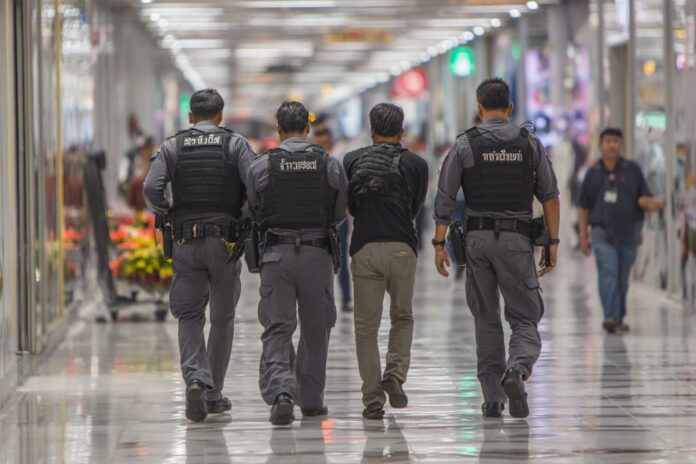Cracking Down on Crypto Scams in Southeast Asia
Thai authorities have once again made headlines with the arrest of a Chinese national accused of defrauding victims out of $6.1 million in Bitcoin. Most importantly, this case underlines the rising threat of cryptocurrency-related scams in Southeast Asia, where high-speed transactions and digital anonymity facilitate these crimes. Because digital asset transactions are becoming increasingly popular, law enforcement is pressured to adapt quickly and efficiently. For additional perspectives on the arrest, refer to this detailed report.
Details of the Arrest: A High-Stakes Manhunt
On June 12, 2025, Thai officials detained Tianwei, the suspect, at Don Mueang Airport in Bangkok. Authorities report that Tianwei attempted a dramatic escape after orchestrating a massive Bitcoin theft, forcing police to quickly mobilize resources across multiple provinces. Therefore, his capture at the airport marked the conclusion of an intense manhunt that spanned various locations.
The Unfolding Scam and Its Impact
The saga began when a complaint was lodged by one of Tianwei’s fellow nationals. The victim recounted how Tianwei, posing as a trusted acquaintance, proposed a seemingly lucrative deal that involved exchanging Chinese yuan for Tether (USDT). Besides that, the victim transferred over 38,000 USDT (approximately $34,000 USD) in trust, only to be left with nothing when the agreed amount of yuan was never delivered. This incident is part of a broader pattern of fraudulent activities that has now escalated to a total loss of around $6.1 million in Bitcoin. For detailed insights on similar acts, see the report on the fraud suspect’s daring escape.
Dramatic Escapes and a Pursued Fugitive
Tianwei’s capture appeared to be a turning point, but his story took a dramatic turn shortly after initial detention. While at the Pattaya City Police Station, he exploited a momentary lapse in security and leaped from a second-floor window, injuring himself in the process. Most importantly, this bold move triggered an extensive manhunt that spanned several Thai provinces. Because the suspect’s determination to flee was so apparent, police intensified their search efforts. Ultimately, Tianwei was located at a hotel in Chanthaburi, an arrest celebrated as a triumph for swift and comprehensive policing. For more on the sequence of events, refer to the detailed Bangkok Post coverage.
Escalating Cryptocurrency Frauds
Thailand has increasingly become a hotspot for cryptocurrency fraud, driven largely by the rapid expansion and relative anonymity of blockchain transactions. Most importantly, this case emphasizes the broader trend of sophisticated scams where fraudsters exploit the lack of robust regulation in digital asset trading. Besides that, similar incidents such as the arrest of a Chinese couple involved in a crypto scam and kidnapping in Pattaya further amplify concerns over investment safety. Readers can explore these cases in depth via the SCMP report.
Lessons for Crypto Investors
Therefore, anyone participating in cryptocurrency transactions, especially those involving international exchanges, should exercise extreme caution. It is recommended to always verify the identity and credibility of the counterparty. Additionally, utilizing established and regulated platforms can provide an extra layer of safety. Most importantly, investors should be wary of any unsolicited proposals that seem too advantageous, since such offers may be designed to deceive. Timely reporting of suspicious activities can help prevent further losses.
The Road Ahead: Enhanced Regulation and Technological Adaptation
Looking forward, the Thai police’s actions in this case signal a broader commitment to curbing cyber-enabled financial crimes. Because technology evolves rapidly, law enforcement agencies are expected to adopt more sophisticated tracking systems and collaborate internationally. This cooperation is critical because crypto fraud is not only a local issue but a global threat. Moreover, the introduction of more comprehensive regulatory frameworks will undoubtedly help fortify the security infrastructure for digital asset transactions.
Conclusion
In conclusion, Tianwei’s arrest showcases both the challenges and potential solutions in the fight against cryptocurrency fraud. Most importantly, increased vigilance, stronger legal frameworks, and public awareness are crucial as crypto transactions become more commonplace. The ongoing evolution of both technology and crime-fighting methods promises a more secure future for investors, provided that regulators and law enforcement maintain their proactive approach.
Additional Perspectives and References
- Infomarine: Detailed analysis of the $6.1 million Bitcoin fraud case
- Bangkok Post: Account of the suspect’s daring escape from custody
- Bangkok Post: Follow-up on the suspect’s arrest in Chanthaburi
- SCMP: Broader trends in crypto-related crimes in Thailand
- Newsflare: Video coverage of the arrest in action



